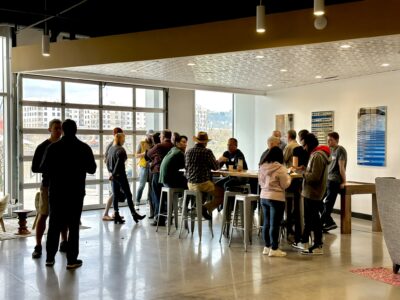If you ventured to Forbes and Murray avenues in Squirrel Hill before the 2010s, you could find a modest but well-loved Barnes & Noble offering coffee and books. In recent years, however, the location has been unoccupied.
Matthew Johnson-Roberson would walk by the empty space almost every day on his way to lunch and lamented that it wasn’t being put to use. Now, as director of the Robotics Institute at Carnegie Mellon University’s School of Computer Science, Johnson-Roberson told Technical.ly he realized there was a way to meet the Oakland research org’s need for additional space and put the former bookstore’s 16,000 square feet to good use.
By the end of October, professors Jean Oh, Zac Manchester and Sebastian Scherer will have moved their research teams consisting of 75 people into the building. Johnson-Roberson said this marks a chapter for the institute when it’s constantly thinking about what role robots are playing in our present and future. With the Robotics Innovation Center — another part of the institute meant to provide robotics researchers space to focus on research, integration and commercialization — slated to open at Hazelwood Green soon, this is a time of growth for the institute.
“I think that robots are going to become an increasingly larger and larger part of the day-to-day lives of people everywhere,” Johnson-Roberson said. “So that means you’re going to be working next to a robot, you’re going to be using a robot to do your job better. You’re going to have products made by robots or delivered by robots, or you’re going to purchase a robot to help you in your home.”

The former Barnes & Noble space. (Screenshot via Google Maps)
Thus, the institute’s leadership feels the time is now to invest in research that maximizes human welfare. That means the institute wants to create more educational programs, hire more people and think of what robotic companies will need in the way of support, while attempting to answer the bigger ethical questions of the field.
“It’s not just how do we build them, but why should we be building this robot versus this robot? Or what are the ethical implications of such a system? And how do we build it responsibly?” Johnson-Roberson said. “And what are the right ways to think about how robots fit into or just some economic systems or existing social systems and how all that combines hopefully to lead to a happier, healthier population?”
Accordingly, the institute has hired technical staff as well as professors to assist with teaching and research who are “thought leaders,” the director said — experts who can “serve as public intellectuals to contribute to the dialogue on where robotics is going and what we should be doing with it.” Currently the institute staff is made up of 1,100 people, including master’s and Ph.D. candidates, with plans to hire more.
The Robotics Institute is also a partner in some of the projects which have received funding from the recent Build Back Better Regional Challenge grant program. This includes the Expanded Pathways to Entrepreneurship project led by InnovatePGH and the Small and Medium Enterprises (SME) Robotics Expansion project led by Catalyst Connection which will aim to make the robotics field more inclusive and modernize manufacturing businesses, respectively.
Nearing a year as the Robotics Institute’s director, Johnson-Roberson feels his time at CMU has been well spent, and he looks forward to helping make the institute and the institution as a whole more inclusive.
“We’re thinking really critically about how to make not just robotics, but all of our educational programs at CMU a largely more diverse and inclusive place,” he said. “So all and all I do feel like this year has gone pretty well so far.”
Atiya Irvin-Mitchell is a 2022-2024 corps member for Report for America, an initiative of The Groundtruth Project that pairs young journalists with local newsrooms. This position is supported by the Heinz Endowments.Join the conversation!
Find news, events, jobs and people who share your interests on Technical.ly's open community Slack





